Issue 53 highlights antique apparatus used in physiological chemistry for the analysis of urine.
Click here for all other issues of Notes from the Oesper Collections and to explore the Jensen-Thomas Apparatus Collection.

by Christian Boyles
No Ashes in the Fire: Coming of Age Black & Free in America
by Darnell L. Moore
HQ76.27.A37 M66 2018
About the book
When Darnell Moore was fourteen, three boys from his neighborhood tried to set him on fire. They cornered him while he was walking home from school, harassed him because they thought he was gay, and poured a jug of gasoline on him. He escaped, but just barely. It wasn’t the last time he would face death.
Three decades later, Moore is an award-winning writer, a leading Black Lives Matter activist, and an advocate for justice and liberation. In No Ashes in the Fire, he shares the journey taken by that scared, bullied teenager who not only survived, but found his calling. Moore’s transcendence over the myriad forces of repression that faced him is a testament to the grace and care of the people who loved him, and to his hometown, Camden, NJ, scarred and ignored but brimming with life. Moore reminds us that liberation is possible if we commit ourselves to fighting for it, and if we dream and create futures where those who survive on society’s edges can thrive.
No Ashes in the Fire is a story of beauty and hope-and an honest reckoning with family, with place, and with what it means to be free.
Is it checked out?
Don’t worry about it. Here are some other titles on the subject.
The Glass Closet : Why Coming Out is Good Business
HF5549.5.S47 B76 2014
Part memoir and part social criticism, The Glass Closet addresses the issue of homophobia that still pervades corporations around the world and underscores the immense challenges faced by LGBT employees.
In The Glass Closet, Lord John Browne, former CEO of BP, seeks to unsettle business leaders by exposing the culture of homophobia that remains rampant in corporations around the world, and which prevents employees from showing their authentic selves.
Drawing on his own experiences, and those of prominent members of the LGBT community around the world, as well as insights from well-known business leaders and celebrities, Lord Browne illustrates why, despite the risks involved, self-disclosure is best for employees—and for the businesses that support them. Above all, The Glass Closet offers inspiration and support for those who too often worry that coming out will hinder their chances of professional success.
Out of bounds: Coming Out of Sexual Abuse, Addiction, and My Life of Lies in the NFL Closet (ebook)
The second NFL player ever to come out as gay and the first ever to come out as HIV-positive, Roy Simmons was an up-and-coming star offensive lineman who quit football after just four years rather than be exposed as gay. Out of Bounds tells his compelling story-from his rape at age 10 to being plucked from his poor Southern background to join the NFL, from his first taste of pro football fame and sudden enormous wealth to his fast-paced, no holds barred nightlife of heavy drugs and countless sexual encounters with women and men. Simmons led a roller-coaster life that peaked in the late 1980s with his playing in the Superbowl. Ultimately, however, reckless living left him penniless, friendless, and on the brink of suicide. Finally, in 1992, Simmons tapped the courage to come out as gay on national TV—then coming out as HIV-positive 10 years later—leading him to a healthy path of sobriety and self-acceptance.
Do the Right Thing (DVD)
PN1997 .D52 1998
It’s the hottest day of the summer. You can do nothing, you can do something, or you can…Do the Right Thing. Directed by visionary filmmaker Spike Lee, Do the Right Thing is one of the most thought-provoking and groundbreaking films of the last 20 years. The controversial story centers around one scorching inner-city day, when racial tensions reach the boiling point in a tough Brooklyn neighborhood. This powerful landmark film combines humor and drama with memorable characters, capturing an unforgettable piece of American history.
by Lauren Wahman

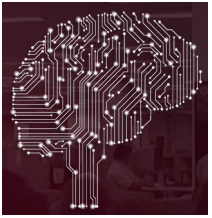 Wednesday, November 28 from 1:30-2:30 pm
Wednesday, November 28 from 1:30-2:30 pm
Muntz 117
Presenters: Arlene Johnson & James Lee, Co-Directors, Digital Scholarship Center
Please join Digital Scholarship Center Co-Directors, Arlene Johnson and James Lee, for a faculty-focused session on the applications of digital humanities/digital scholarship in the classroom as well as support and resources for digital humanities/digital scholarship activities and initiatives in your teaching and research. This workshop is sponsored by the UCBA Library and the Learning + Teaching Center.
Please Note: Due to travel requirements for these presenters, please make sure to register through Faculty OneStop (click image below). This workshop requires a minimum of 5 participants to be held.
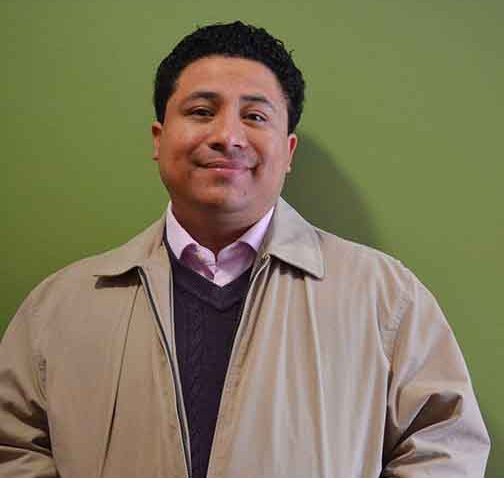 Please join us November 7, 2018 at 2:30 pm for a reading and book signing by Manuel Iris, author of Translating Silence/Traducir el silencio. Appointed Cincinnati Poet Laureate in 2018, Manuel is charged with “promoting poetry appreciation, encouraging the reading and writing of poetry throughout the city, and composing and reading poems for special events and occasions.” (City of Cincinnati) Come listen as he brings his poetic inspiration to UC Clermont.
Please join us November 7, 2018 at 2:30 pm for a reading and book signing by Manuel Iris, author of Translating Silence/Traducir el silencio. Appointed Cincinnati Poet Laureate in 2018, Manuel is charged with “promoting poetry appreciation, encouraging the reading and writing of poetry throughout the city, and composing and reading poems for special events and occasions.” (City of Cincinnati) Come listen as he brings his poetic inspiration to UC Clermont.
He will also host a Q & A and writing workshop the same day, at 10:10 am in Student Services, room 240.
Penny McGinnis
Technical Services Manager
The 2017-2018 Year In Review is now available online and includes fast facts, figures and staff highlights.
In collaboration with the UC Clermont English, Languages & Fine Arts Department, the Clermont College Library is proud to announce A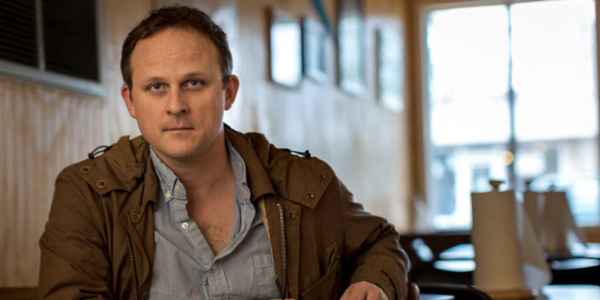 n Evening With John Jeremiah Sullivan on Wednesday, November 14. John Jeremiah Sullivan is a contributing writer for The New York Times Magazine and the southern editor of The Paris Review. He writes for GQ, Harper’s Magazine, and Oxford American, and is the author of Blood Horses and Pulphead.
n Evening With John Jeremiah Sullivan on Wednesday, November 14. John Jeremiah Sullivan is a contributing writer for The New York Times Magazine and the southern editor of The Paris Review. He writes for GQ, Harper’s Magazine, and Oxford American, and is the author of Blood Horses and Pulphead.
Tickets for Sullivan’s talk are $5. Tickets to a VIP reception with the author (to include the talk, refreshments, and a signed copy of Pulphead) are also available on a limited basis. Proceeds from the event will benefit Clermont College scholarships.
Reserve your seat today and support the future of UC Clermont students: https://foundation.uc.edu/sullivan
Katie Foran-Mulcahy
Library Director
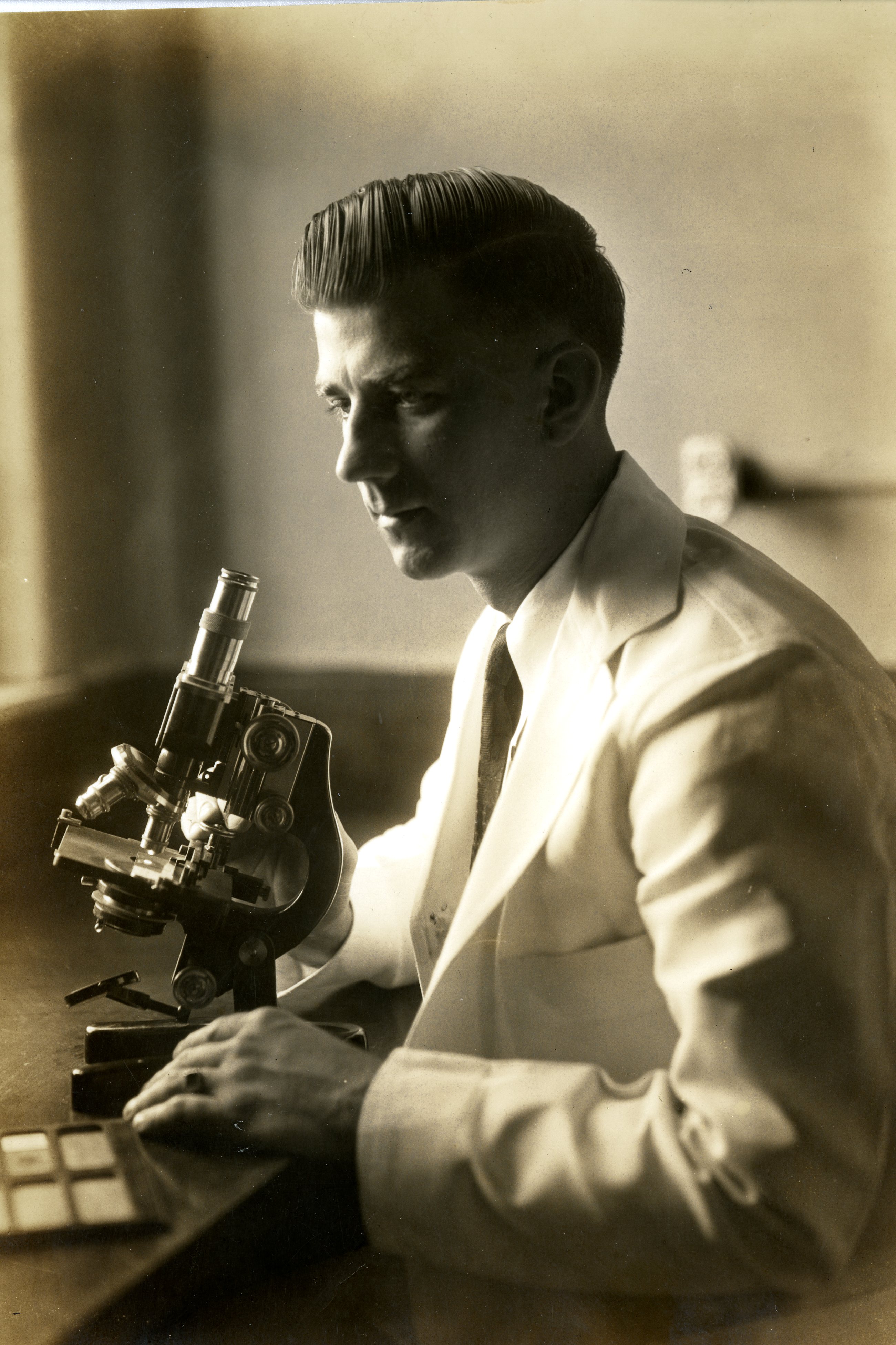
Young Dr. William A. Altemeier
Hi, I’m Alex Temple, the archivist processing the William Altemeier Archival Collection thanks to a generous gift from the Altemeier family. I’m a Cincinnati native and UC graduate. After completing my BA in History here at UC, I went on to Kent State’s School of Information, where I earned a Masters in Library and Information Science with a specialization in Archives & Special Collections.
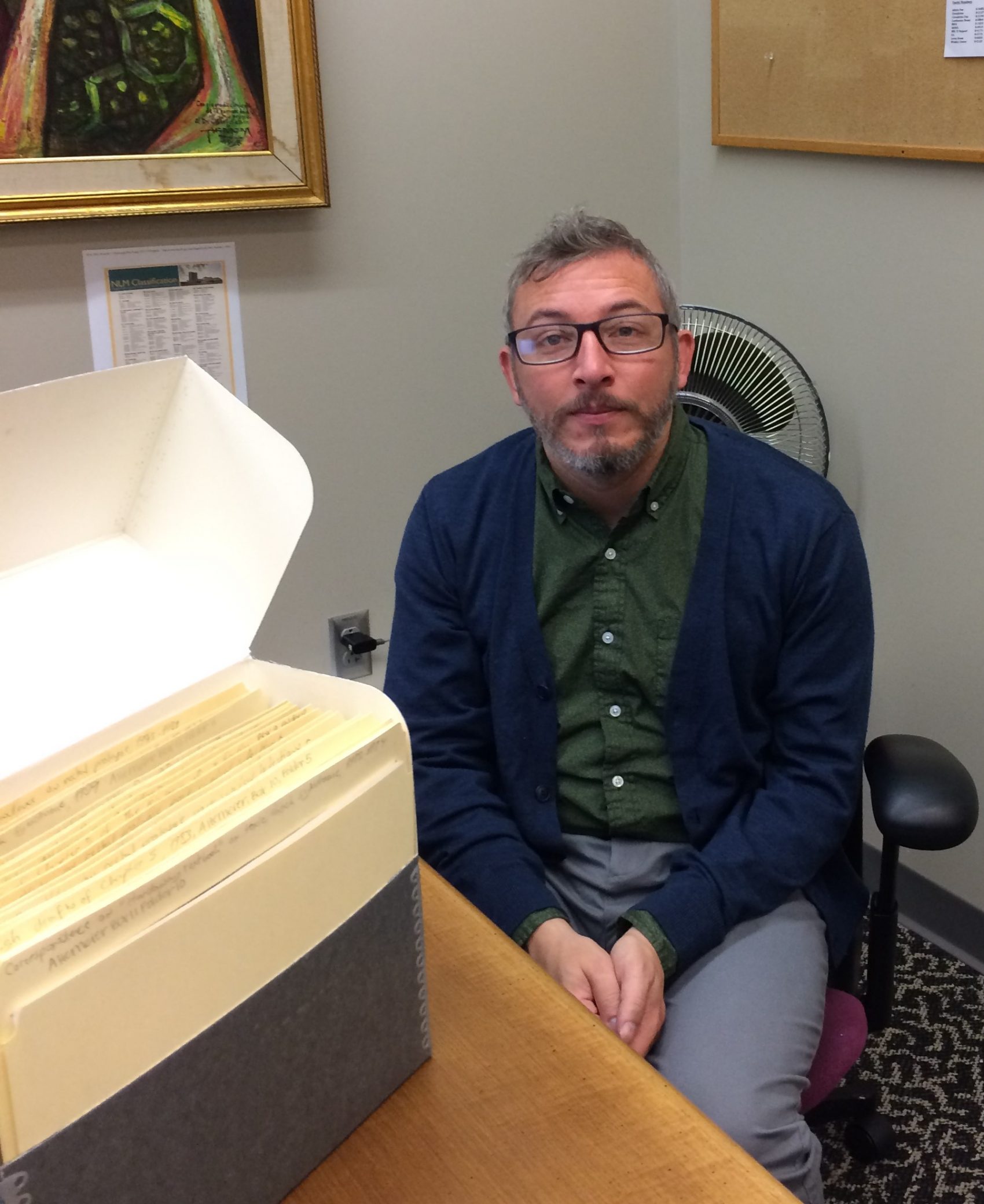 Preserving history and making it accessible has been a passion of mine, and I have been fortunate enough to work in a variety of settings and types of work. I started at the Public Library of Cincinnati and Hamilton County in 2006, where I performed reference assistance and have contributed to numerous projects involving rare and fragile material. I have been a volunteer at the Preservation Lab at Langsam Library for four years, where I help to mend damaged books and other material. For a look at the exciting work that happens there, you can visit their blog at http://thepreservationlab.org/. I have also participated in a massive digitization project on the Turks & Caicos Islands, where we digitized government and church records, such as marriage and baptisms. I am also processing a collection for another UC notable, Benjamin Gettler, at the Archives & Rare Books Library here on campus.
Preserving history and making it accessible has been a passion of mine, and I have been fortunate enough to work in a variety of settings and types of work. I started at the Public Library of Cincinnati and Hamilton County in 2006, where I performed reference assistance and have contributed to numerous projects involving rare and fragile material. I have been a volunteer at the Preservation Lab at Langsam Library for four years, where I help to mend damaged books and other material. For a look at the exciting work that happens there, you can visit their blog at http://thepreservationlab.org/. I have also participated in a massive digitization project on the Turks & Caicos Islands, where we digitized government and church records, such as marriage and baptisms. I am also processing a collection for another UC notable, Benjamin Gettler, at the Archives & Rare Books Library here on campus.
While I’m just starting to scratch the surface of the William Altemeier Collection, I find myself really excited to learn about his life and work. He contributed a great deal to the medical field in his time with hundreds of published articles, and the research, drafts, and manuscripts in the collection will be fascinating to look at. I really look forward not only to learning about his life, but also arranging and describing his collection, working to digitize select materials, and creating an online exhibit. I’ll be sharing notable pieces with you along way, so check back for updates! I’d love to hear your questions or stories, please email me at templea@mail.uc.edu.
Join the University of Cincinnati Libraries for “Coming Together to Give Thanks” ~ Thursday, November 15, 3:00-4:30pm, Walter C. Langsam Library’s 4th floor.
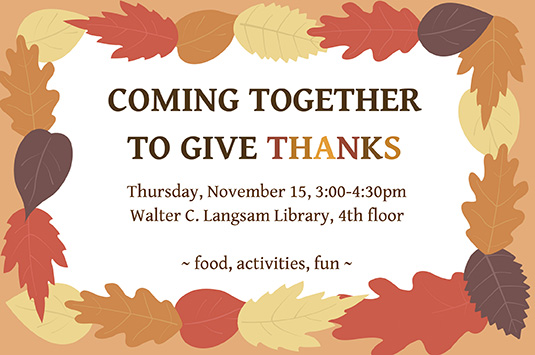
In the program:
And, of course, there is no Thanksgiving without food, so expect that (including pies)!
The event is free and open to all.
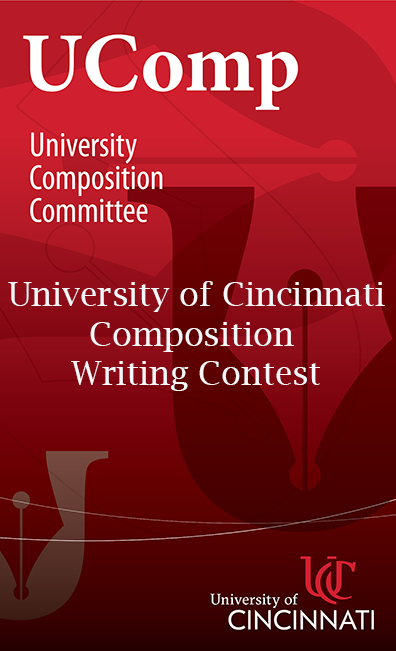
The English Composition Writing Contest is an annual celebration of the best student writing in English composition courses across all colleges at the University of Cincinnati. Students are encouraged to submit their best work from Intermediate Composition, English Composition or Introduction to Composition. For details please go the UC Composition Writing Contest Submission Portal.
Essays or multimodal projects composed during Spring, Summer, or Fall 2018 are eligible for submission.
The deadline for submissions is January 15, 2019.
Prizes are awarded for the top essay(s) in Intermediate Composition, English Composition, and Introduction to Composition. Additionally, there are prizes for the top multimodal entries.
Additional awards are sponsored by Dr. Cheryl Dunn, Emerita Faculty from the College of Engineering and Applied Science and the UC Libraries. The Dunn Award celebrates outstanding student writing at the University of Cincinnati. UC Libraries support the best research entry. The winners of these awards are selected from entries submitted to the categories listed on the application form.
Winning student essays and projects are celebrated at the Writing Awards Ceremony each spring on the Clifton campus. Winners and their instructors will be contacted in February with details about their awards and the ceremony.
To submit, upload your entry, indicating the course, and complete the form for each project or essay you are submitting using this link. Only complete submissions will be considered for judging.
by Kellie Tilton
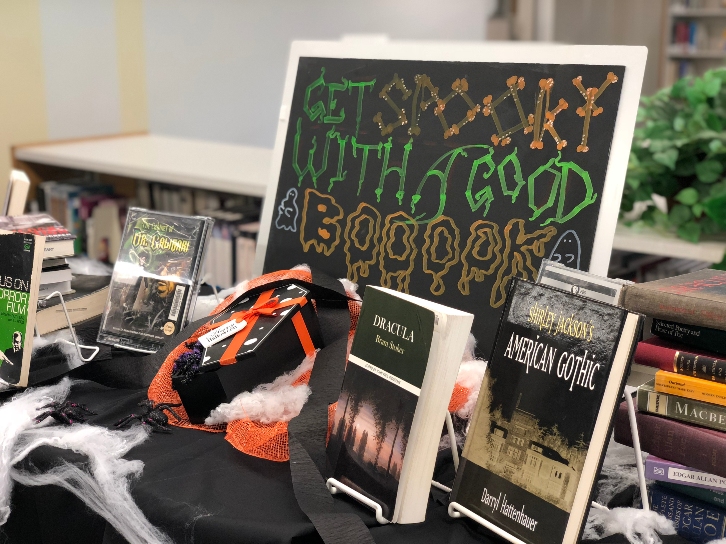
“I was never kinder to the old man than during the whole week before I killed him.”
– The Tell-Tale Heart by Edgar Allan Poe
From witches to aliens to monsters to ghosts, the UCBA Library has you covered for all your horror-related reading needs. Catch up with Edgar Allen Poe, read up on hauntings of college campuses or expand you horror film knowledge and more with books on display until Halloween.